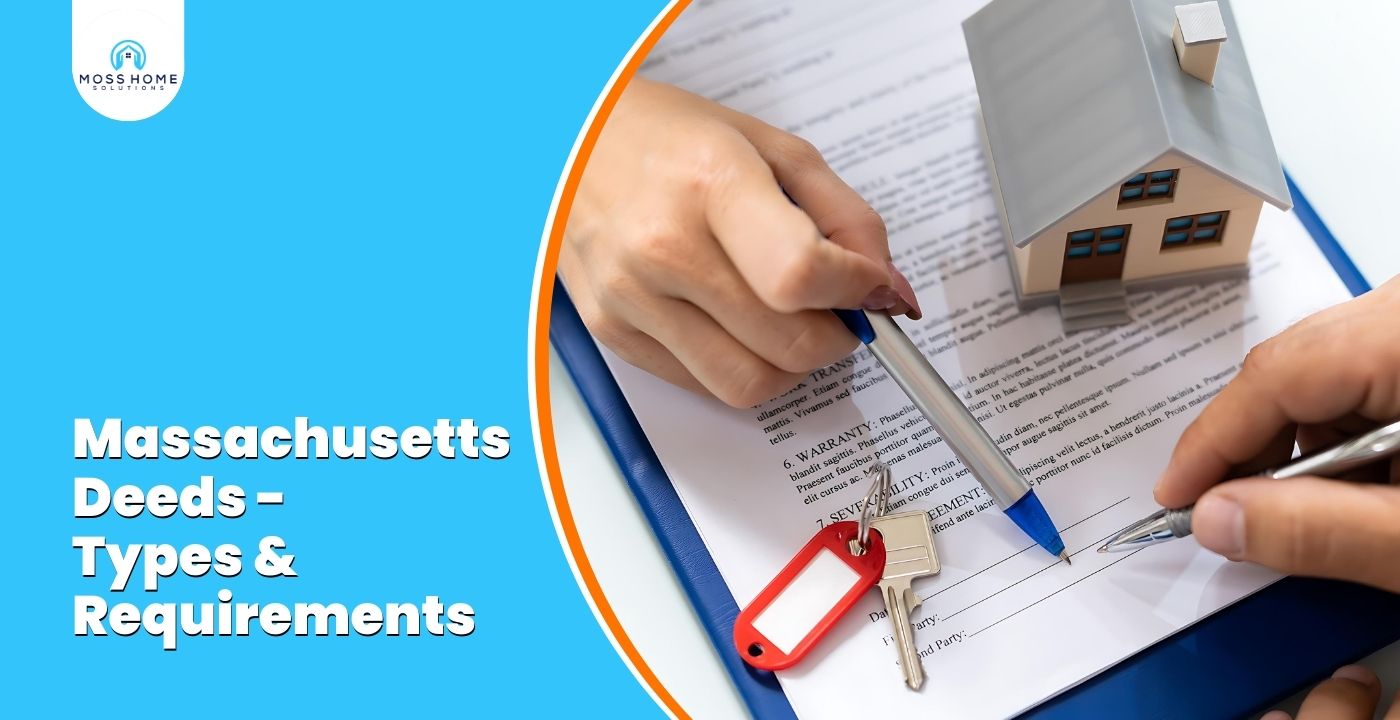Massachusetts deeds can be tricky.
From general warranty to quitclaim, special warranty to bargain and sale deeds, navigating these options is crucial for any property transaction in the Bay State.
We’ll cover everything you need to know – from common deed types and their uses to essential legal requirements, formatting specifications, and the recording process.
Whether you’re buying your first home, selling a property, or just curious about real estate law, understanding these basics can save you headaches and potential legal issues down the road.
Key Notes
- Massachusetts recognizes several types of deeds, including general warranty, quitclaim, special warranty, and bargain and sale deeds.
- Quitclaim deeds are the most common for residential transactions in Massachusetts, balancing simplicity and some assurance of title.
- Valid deeds must include specific elements such as property description, names and addresses of parties involved, grantor’s signature, and notarization.
- Recording a deed with the local Registry of Deeds is crucial for making the property transfer official and legally binding.
Types of Deeds in Massachusetts

A deed serves as proof of ownership when transferring property from one party to another.
There are various real estate deeds in Massachusetts, each with unique characteristics and applications:
1. General Warranty Deed
A Massachusetts general warranty deed is the most comprehensive type, offering the highest level of protection for the buyer.
This is because the seller guarantees the property’s title is free from any encumbrances or defects, both when the seller owned it and in the past.
You’ll find this type of deed commonly used in standard real estate transactions where the buyer wants the maximum level of assurance regarding the property’s title.
2. Quitclaim Deed
A quitclaim deed is a simple way to transfer ownership of a property in Massachusetts. It’s the most common type of deed used for residential real estate transactions in the state.
Unlike other deeds, a quitclaim deed only transfers the current owner’s interest in the property to the new owner. It doesn’t guarantee the property is free from other claims, liens, or issues.
Quitclaim deeds are often used when:
- Transferring property between family members
- The seller isn’t sure of their ownership rights
- Removing an ex-spouse from the title after a divorce
- Transferring property into a trust
- Correcting errors in previous deeds
These deeds are popular because they are easy to use and cost-effective. They also offer some assurance to the buyer that the seller hasn’t done anything to cause problems with the property’s title during their ownership.
When buying a property with a quitclaim deed, the buyer should still do a title search to check for potential issues. A real estate lawyer can help review the title and advise on the best way forward.
3. Special Warranty Deed
This document is a hybrid between a general warranty deed and a quitclaim deed. While it does give the buyer some protection against title defects, these only apply to issues that arose when the seller owned the property.
Special warranty deeds are similar to quitclaim deeds in that they only transfer the current owner’s interest in the property without guaranteeing the title.
Corporations and LLCs often use special warranty deeds to avoid the broader liability of a general warranty deed when transferring property.
4. Bargain and Sale Deed
A bargain and sale deed is the simplest type of deed in Massachusetts. It transfers the property to the buyer as-is, without any promises or guarantees on its condition.
This type of deed isn’t commonly found in typical real estate transactions. It is more often used in foreclosure sales, tax sales, or situations where the seller doesn’t want to make any claims about the property’s title.
Choosing The Right Deed
You’ve scanned the MA housing market and found the perfect home. It’s now time to draft your real estate deed.
Choosing the right one is important as it affects how much you’re protected and who’s responsible if anything goes wrong down the line.
We suggest you get advice from a real estate attorney as the various deed types and legal jargon can be a lot to wrap your head around. An expert in the field can look at the details of your specific situation and walk you through the nuances of each deed type.
Essential Legal Requirements for Deeds in MA
The Massachusetts Deed Indexing Standards state a deed needs certain important parts to be valid.
Here are the essential elements:
- Property Description: The deed must include a clear and detailed description of the property being transferred.
- Names and Addresses: The full names and addresses of both the seller (grantor) and the buyer (grantee) must be clearly written.
- Grantor’s Signature: The seller must sign the deed to show they want to transfer the property.
- Notarization: The seller’s signature must be notarized, which means a notary public verifies the seller’s identity and confirms they are signing willingly.
- Delivery and Acceptance: The deed must be given to the buyer who then accepts it to complete the property transfer.
Formatting of Deeds

Massachusetts has specific formatting requirements for deed acceptance at the Registry of Deeds. These may vary slightly from one registry to the next but, generally, here’s what you need to know:
| Requirement | Details |
|---|---|
| Paper Size | 8.5 inches by 14 inches (legal size) |
| Font Size | Not specifically mandated, but must be legible and dark enough for scanning |
| Margins | Large enough for legibility in scans; 1st page must include a 3-inch by 3-inch blank space in the upper right-hand corner for recording information |
| Printing | Single-sided only; double-sided pages not accepted |
| Signature Requirements | Original signatures, with names printed beneath; notarization is required |
| Document Presentation | If no blank space for recording information is provided, a cover sheet must be attached |
| Attachment Requirements | Referenced exhibits must be included at the end of the document; reduced attachments not accepted |
| Ink Color | All text dark enough to reproduce clearly in scans (no highlighting allowed) |
Massachusetts Deed Recording
After a deed is prepared and signed, it must be recorded with the local Registry of Deeds to make the property transfer official and legally binding. This is an important step as it protects the buyer’s ownership rights.
Here’s how to record a deed:
- Submit the Deed: Take the signed deed to the Registry of Deeds, along with any fees you have to pay. The fee for recording a deed in Massachusetts is about $155.
- Notarization: Before recording, the deed must be notarized. This means a notary public confirms the seller’s identity and that they signed the deed willingly.
- Review Process: The Registry of Deeds will check the deed to ensure it meets all legal requirements. After this, the transfer of ownership is officially recorded.
- Delivery and Acceptance: The deed only comes into effect once it’s delivered to and accepted by the buyer.
Points To Remember:
- Massachusetts has two systems for recording deeds: recorded land and registered land. Make sure you submit the deed to the correct system, as they have different requirements.
- If the property is sold for more than $100, a deed excise tax has to be paid before recording. The tax is usually $2.28 for every $500 of the sale price, but it can vary by county.
- Some counties, such as Nantucket and Dukes, require deeds to go through a land bank process before being recorded.
- Once recorded, keep a copy of your deed in a safe place. You can also get a copy from the Registry of Deeds if needed.
Electronic Recording
You also have the option to electronically record a deed, allowing parties to submit their documents online rather than in person at the Registry of Deeds.
This method offers you convenience, speed, and efficiency, and many registries are now accepting electronic submissions.
Extra Considerations
Marital Status Considerations
Before drawing up a deed, think about the marital status of everyone involved. This ensures spousal rights are properly addressed, which can affect whether the deed is valid and enforceable.
Spousal Signatures for Primary Residences
If the property is the main home of a married couple, both spouses usually need to sign the deed. This protects the rights of the non-owner spouse.
Importance of Granting Clause Wording
The specific wording used in the granting clause of the deed is very important. It can change how the property is transferred and what protections are included. Working with a skilled real estate attorney can help you ensure the language is precise and appropriate.
Specifying Multiple Ownership
If there are multiple owners, the deed should specify how they will own the property together, such as tenants in common or joint tenants.
Addressing Name Changes
If the seller’s name has changed since they acquired the property, it’s important to clarify this in the deed using terms like “also known as” (a/k/a) to avoid confusion.
Common Issues and How to Avoid Them

Preparing and recording a deed is a meticulous process, so there are several issues that can arise during a Massachusetts deed transfer.
These include:
- Mistakes when preparing the deed, such as inaccurate property descriptions or missing information.
- Problems during the recording process, like submissions being rejected because the documentation is incomplete.
Frequently Asked Questions
What are the requirements for a deed in Massachusetts?
A valid deed must include the full names and addresses of the grantor and grantee, a clear description of the property, the grantor’s signature, and notarization. It should also be recorded at the local Registry of Deeds.
What is the difference between a title and a deed in Massachusetts?
A deed is a legal document that transfers property ownership, while a title refers to the legal right to own and use that property.
How do I record a deed in Massachusetts?
Take your signed and notarized document along with the required fee to the local Registry of Deeds. The Registry will review the deed and officially record the transfer of ownership.
Conclusion
From quitclaim deeds dominating residential transfers to the recent NAR settlement shaking up commission structures, Massachusetts property deeds are as dynamic as the Bay State’s real estate market.
Whether you’re navigating the intricacies of spousal signatures on your Cape Cod cottage or deciphering the legal jargon of a special warranty deed for your Boston brownstone, the deed maze can be daunting.
Remember, even a misplaced comma in that 3-inch by 3-inch recording space can derail your transaction.
Tired of wrestling with deed complexities? Sidestep the paperwork avalanche. Get a fast, no-hassle cash offer on your Massachusetts property today. We’ll handle the deed drama while you plan your next chapter.





